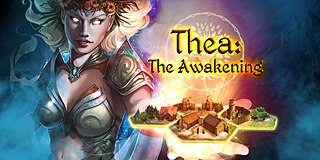
EverQuest is a 3D fantasy-themed massively multiplayer online role-playing game (MMORPG) originally developed by Verant Interactive and 989 Studios for Windows PCs. It was released by Sony Online Entertainment in March 1999 in North America, and by Ubisoft in Europe in April 2000. A dedicated version for Mac OS X was released in June 2003, which operated for ten years before being shut down in November 2013. In June 2000, Verant Interactive was absorbed into Sony Online Entertainment, who took over full development and publishing duties of the title. Later, in February 2015, SOE's parent corporation, Sony Computer Entertainment, sold the studio to investment company Columbus Nova and it was rebranded as Daybreak Game Company, which continues to develop and publish EverQuest.

Pool of Radiance is a role-playing video game developed and published by Strategic Simulations, Inc (SSI) in 1988. It was the first adaptation of TSR's Advanced Dungeons & Dragons (AD&D) fantasy role-playing game for home computers, becoming the first episode in a four-part series of D&D computer adventure games. The other games in the "Gold Box" series used the game engine pioneered in Pool of Radiance, as did later D&D titles such as the Neverwinter Nights online game. Pool of Radiance takes place in the Forgotten Realms fantasy setting, with the action centered in and around the port city of Phlan.

A role-playing video game, role-playing game (RPG) or computer role-playing game (CRPG) is a video game genre where the player controls the actions of a character immersed in some well-defined world, usually involving some form of character development by way of recording statistics. Many role-playing video games have origins in tabletop role-playing games and use much of the same terminology, settings, and game mechanics. Other major similarities with pen-and-paper games include developed story-telling and narrative elements, player character development, complexity, as well as replay value and immersion. The electronic medium removes the necessity for a gamemaster and increases combat resolution speed. RPGs have evolved from simple text-based console-window games into visually rich 3D experiences.
Warlords is a video game series created by Steve Fawkner, in which role-playing elements are combined with turn-based strategy in a fantasy setting. The series began with Warlords in 1990 and includes three other games, two expansion packs, and several spinoffs.

Dungeon Siege II is an action role-playing video game, the sequel to 2002's Dungeon Siege. It was developed by Gas Powered Games and released in 2005. The story is a continuation of the Dungeon Siege storyline. An expansion Broken World was released in 2006.

Titan Quest is a 2006 action role-playing game developed by Iron Lore Entertainment and published by THQ for Windows, first physically and then in 2007 through Steam. A mobile port was developed by DotEmu and published in 2016, and versions for PlayStation 4, Xbox One and Nintendo Switch were released in 2018. All these versions were published by THQ Nordic. The story follows a player-created protagonist as they navigate Ancient Greece, Egypt and China on a quest to defeat the Titans after they escape from their ancient prison. The gameplay is similar to the Diablo series, with player navigation being handled with a mouse-driven tile-based interface, and gameplay revolving around role-playing mechanics and real-time combat. Four expansions have been created for the game; Titan Quest: Immortal Throne in 2007, and three others between 2017 and 2021.

Dungeons & Dragons Tactics is a tactical role-playing game released on the PlayStation Portable handheld video game console. It is set in the world of Dungeons & Dragons and uses a strict interpretation of the Dungeons & Dragons 3.5 Edition rule set.

Drakensang: The Dark Eye is a 2008 role-playing video game developed by Radon Labs and published by dtp. It is the first video game in The Dark Eye universe since Attic's Northlands Trilogy from the 1990s. it was followed by the prequel River of Time, which also received an expansion Phileasson's Secret. all of them were put in a collection that is referred as the Drakensang Saga.

Puzzle Quest: Challenge of the Warlords is a puzzle video game designed by Steve Fawkner for Australian game developer Infinite Interactive and published by D3 Publisher in 2007. The game combines role-playing with tile-matching elements. Taking place in a high fantasy setting, the player moves their character around the game's world and encounters monsters and other enemies to fight so as to gain experience and acquire treasure as in a typical role-playing game. Combat takes place on a board similar to Bejeweled, and by making matches of coloured gems, the combatants can cause damage to their opponents, cast spells, or perform other abilities that affect the flow of the game.

WonderKing Online was a free-of-charge, 2D, side-scrolling massively multiplayer online role-playing game created by the South Korean company ToWinGames.

Puzzle Quest 2 is a video game developed by Infinite Interactive for the Nintendo DS, Xbox Live Arcade, iOS, Android, Windows Phone 7, and Microsoft Windows. It was released on June 22, 2010 by D3 Publisher. A version for the PlayStation Portable was in development, but was cancelled due to sound bugs. It is the sequel to Puzzle Quest: Challenge of the Warlords, and like its predecessor, it combines role-playing with strategy and puzzle elements. It uses a competitive, Bejeweled-style, "match three game" playfield to simulate combat and other activities common to role-playing games.

King Arthur: The Role-Playing Wargame is a real-time tactics and role-playing video game developed by NeocoreGames and published by Paradox Interactive in North America, Ubisoft in Europe, and E-Frontier in Japan. It seeks to blend elements of the real-time tactics, role-playing, and grand strategy genres into one. A sequel titled King Arthur II: The Role-Playing Wargame was released online in Europe on September 20, 2011, and then worldwide in 2012.
Dragon Quest is a series of role-playing video games that originated in 1986 with the release of the first game in the series. Although the games are not related in terms of story, many aspects of the gameplay are consistent throughout the series. Each game in the series add new elements to the gameplay, such as longer quests, character classes, or different ways of story-telling.

Terraria is a 2011 action-adventure sandbox game developed by Re-Logic. The game was first released for Windows and has since been ported to other PC and console platforms. The game features exploration, crafting, building, painting, and combat with a variety of creatures in a procedurally generated 2D world. Terraria is one of the best-selling video games of all time, selling 58.7 million copies as of 2024.

KingsRoad is a browser-based massively multiplayer online role-playing game made by American studio Rumble Entertainment.

Expeditions: Conquistador is a squad-based tactical role-playing game developed by Danish developer Logic Artists and released by BitComposer for Windows, Linux and Macintosh on May 30, 2013. The player takes the role of a Spanish conquistador leading an expedition to Hispaniola and Mexico in 1518 to 1520. The game features resource management, a branching storyline, and interactive fiction elements. Expeditions: Conquistador was partially funded by Kickstarter. The Windows Phone version of the game, a strategy adventure game with a branching narrative, was released in April 2012. Logic Artists has released two further Expeditions games: Expeditions: Viking in 2017, and Expeditions: Rome in 2022. THQ Nordic acquired the Expeditions Series intellectual property (IP) in November 2018.

Shattered Planet is a roguelike role-playing video game developed by Kitfox Games. The player assumes the role of a clone who is tasked with researching and cataloging alien wildlife. The iOS version was released on March 27, 2014. The Android version was released on April 10, 2014. Shattered Planet was released for Microsoft Windows and Mac OS on July 3, 2014.

Puzzle Quest is a series of puzzle video games where tile-matching serves as the combat for a role-playing video game. The first game was released in 2007: Puzzle Quest: Challenge of the Warlords, a spin-off of the Warlords series of turn-based strategy games. It has since expanded to other licensed content. Puzzle Quest: The Legend Returns, was released in 2019.

Mistover is a 2019 roguelike dungeon crawler role-playing video game developed and published by Krafton for Microsoft Windows, Nintendo Switch, and PlayStation 4. Mistover is set in a ravaged world recovering from a mass invasion of monstrous creatures from another realm, and its storyline follows the journey of a party of adventuring heroes who are on a quest to discover the source of the invasion. Players navigate environments from an isometric perspective with a party of procedurally generated player characters drawn from a roster of eight character classes to fight monsters and acquire loot recovered from the exploration of levels. A phenomenon known as "mist" is prevalent throughout the game world and negatively influences its characters, monsters, and items.

Thea: The Awakening is a 2015 strategy video game developed and released by MuHa Games. It is based on Slavic folklore and includes minigames based on several different genres. It was followed by Thea 2: The Shattering.



















